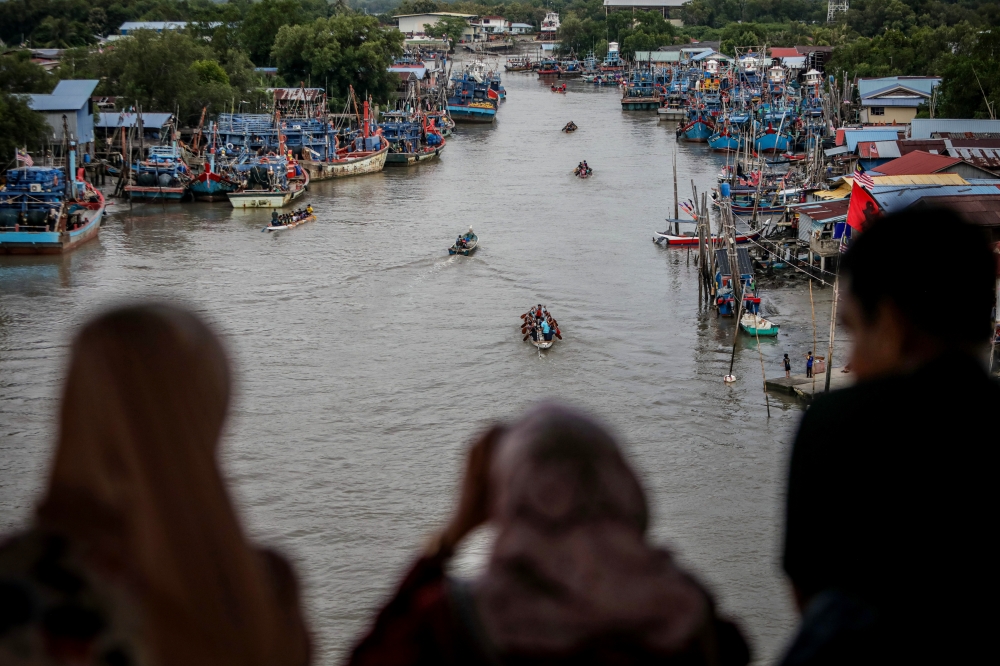KUALA LUMPUR, Sept 16 — “What is the meaning of independence if our seas – the lifeblood of Malaysia as a maritime nation – are destroyed and can no longer be restored?”
This is a question that often lingers in the writer’s mind, especially when discussing ocean and maritime matters, which have long been part of Malaysia’s identity for centuries.
Along these coastlines lie the nation’s marine treasures: fisheries and marine biodiversity, which are not only sources of livelihood but also strategic assets shaping the identity and sovereignty of Malaysia as a free maritime nation.
However, the resources we have been blessed with have increasingly come under threat due to issues like global warming, port expansions, land reclamation, coastal development, and marine tourism. All this has exerted pressure on our ecosystems and ultimately affected the long-term availability of natural resources.
Its economic contribution is also significant in the fisheries sector.
Director-General of Fisheries, Datuk Adnan Hussain, told Bernama recently that the industry contributed about RM11.8 billion to the nation’s 2024 gross domestic product (GDP) versus RM11.5 billion a year ago, a 2.9 per cent growth.
“Simultaneously, the national fish landing level remains healthy, with about 1.4 million tonnes recorded annually. Of this total, 80 per cent comes from coastal marine catches,” he said.
“As of now, 43,000 vessels have been licensed by the Fisheries Department (DOF) nationwide, and we also impose a moratorium, meaning no new licences are being issued.
“At the same time, we only replace licences for fishermen who have completed the legalisation process to ensure a sustainable ecosystem and adequate fish supply for the country,” he said.
However, beyond these figures lie major challenges – from climate change, overexploitation to foreign encroachment – all of which test the resilience of Malaysian waters.
“The country’s fish supply self-sufficiency level is currently at 90.7 per cent. We import to meet local needs for the rest. We also export specific fish species to neighbouring countries such as Singapore, Thailand, and China,” he added.
Various initiatives have been implemented, including establishing Fisheries Management Areas (FMA), introducing artificial reefs, and strengthening enforcement against illegal, unreported, and unregulated fishing activities, he said.
Climate change and threats
Adnan said climate change has had direct and indirect impacts on Malaysia’s marine ecosystems, the most notable being rising sea temperatures that affect marine parks and marine reserves.
“The El Niño phenomenon, for instance, has led to coral bleaching in several marine areas,” he said, adding that extreme sea temperature changes also increase risks to caged-fish farming along coastlines.
Hot temperatures, for example, can cause algae blooms or red tides, which can lead to fish deaths.
“High sea temperatures not only trigger coral bleaching, resulting in coral death, but also impact mussels and clams in Melaka due to biotoxin pollution.
“This heat stress also affects marine fish like barramundi, snapper, grouper, and golden pomfret, increasing the risk of disease as stressed fish are more vulnerable to injury and outbreaks,” he said.
Rising sea temperatures force pelagic species – round scad, Indian mackerel, and short-bodied mackerel – to deeper, cooler waters, making it difficult for seine fishermen, who use a large net to bring in their catch.
Adnan said that climate change also impacts aquaculture activities in ponds and rivers, which may dry up, leading to disease outbreaks due to fish stress.
Heavy rainfall or La Niña events may cause flooding, damage cages and lead to fish deaths due to debris, sudden temperature shifts, and habitat destruction.

Climate change also impacts aquaculture activities in ponds and rivers, which may dry up, leading to disease outbreaks due to fish stress. — Bernama pic
Laws as a shield
Malaysia reportedly lost about RM823 million due to foreign fishing vessel encroachments between 2020 and 2024. This includes losses from commercial fishing, damage to marine habitats, and pressure on local fisheries.
Hence, legal enforcement has become a new shield in defending national resources.
The Fisheries (Amendment) Bill 2025, passed by the Dewan Rakyat on July 29, aims to strengthen actions against illegal, unreported, and unregulated activities, in line with Malaysia’s international commitment to combat such practices.
It includes efforts to curb foreign vessel incursions into national waters and ensure better regulation of fishing activities.
Additionally, Malaysia signed the Fisheries Subsidies Agreement in February 2024, which outlines measures to address global fisheries subsidies contributing to illegal, unreported, and unregulated fishing.
Malaysia also expressed commitment to the Port State Measures Agreement (PSMA). Yet to be ratified fully, it nevertheless indicates its intent to comply with international standards in tackling illegal fishing.
“One key amendment in this bill is extending control to local vessels. Previously, the regulation only applied to foreign vessels. They were prohibited from transferring supplies, including fuel, at sea without approval.
“With the new amendment, this prohibition also applies to local vessels to prevent misuse,” said Adnan.
Foreign vessels that wish to dock or land their catches at Malaysian ports must now obtain local authorities’ approval, allowing the authorities to verify whether they are on the illegal, unreported, and unregulated list.
On artificial reefs, Adnan said they have been well-received by target groups and fishermen. However, due to limited funding, DOF must prioritise the most critical areas.
“According to a study by Universiti Malaysia Terengganu, if I am not mistaken, the biomass from reef areas ranges from 600 kg to 6,000 kg of fish, depending on the location,” he said.
Various conservation efforts have also been implemented to prevent extinction in cooperation with federal and state agencies. This includes public awareness campaigns to discourage the consumption of turtle eggs to ensure species survival.
Sting rays are permitted to be caught, but Malaysia prohibits ray nets, which are drift nets with mesh sizes exceeding 10 inches, because they may trap turtles.
Blue Economy for long-term sustainability
Conservation does not mean being anti-development. Malaysia must balance sustainability with maritime advancement via the “blue economy” concept.
Adnan said the DOF does not oppose development. It is always ready to provide technical advice for any project.
“Usually, large projects require an environmental impact assessment (EIA) report, so we give input in every consultation, including port construction or land reclamation projects.
“We highlight the impacts on the fisheries sector and trust that these projects undergo stringent approval processes, including EIAs presented to the National Physical Council and approval from the Environmental Department.”
Adnan emphasised that DOF also works with relevant parties to give input on the impact of projects on specific areas.
“For example, we gave technical input on the number of affected fishermen, lost primary resources, and mitigation measures needed to minimise impacts from Penang and Johor reclamation projects.
On reports that stingray and anchovy populations have been seriously affected by development, Adnan clarified that unsustainable fishing methods were the main cause, and not port development.
“We have, therefore, introduced conservation measures such as closed seasons for anchovies. For example, in Langkawi, anchovy fishing is not allowed in September because it is the breeding season. We have also banned harmful fishing gear like dragon traps and regulated trawling activities.”
Adnan said maritime development and the fisheries sector must progress in tandem, with all developments discussed with stakeholders for mutual benefit.
Defending biodiversity is no longer an option. It is a responsibility in the spirit of modern patriotism, and it also forms the pillar of the national economy.
The commitment to protect biodiversity and preserve Malaysia’s vast marine wealth must continue to ensure the country remains a strong, sustainable and independent maritime nation for future generations.
From artificial reefs to fisheries laws, from small fishermen to international policies, every piece of the puzzle is part of Malaysia’s maritime struggle.
The true meaning of Merdeka is not just freedom from colonisation, but ensuring our waters remain rich, and the economy thrives. This is the legacy handed down to future generations. — Bernama






